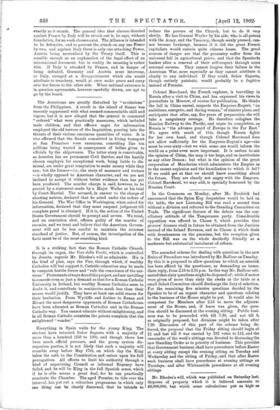Everything in Spain waits for the young King. The electors
have returned Senor Sagasta with a majority of more than a hundred (250 to 130), and though there has been much official pressure, and the group system dis- organises parties, it is not likely that such a majority will crumble away before May 17th, on which day the King takes the oath to the Constitution and enters upon his full prerogatives. All efforts to limit his authority through a kind of supervising Council or informal Regency have failed, and he will be King in the full Spanish sense, which if, he is able means a great deal, for he can practically nominate the Chamber. The aged Premier, to tide over the interval, has put out a colourless programme in whieh only one thing can- be clearly discerned, that- he intends to
reduce the powers of the Church, but to do it very sloivly. He has General Weyler Fry his side, who is all-potent with the Army, and the Treasury, though sorely pressed, can- not become bankrupt, because if it did the great French capitalists would sustain quite ruinous losses. The great sources of danger are that the peasantry suffer from the universal fall in agricultural prices, and that the Spaniards hanker after a renewal of their self-respect through some external success. They cannot forgive their failure in the American War, more especially as they cannot attribute it clearly to any individual. If they could, Senor Sagasta, though entirely patriotic, would probably be a fugitive instead of Premier.










































 Previous page
Previous page